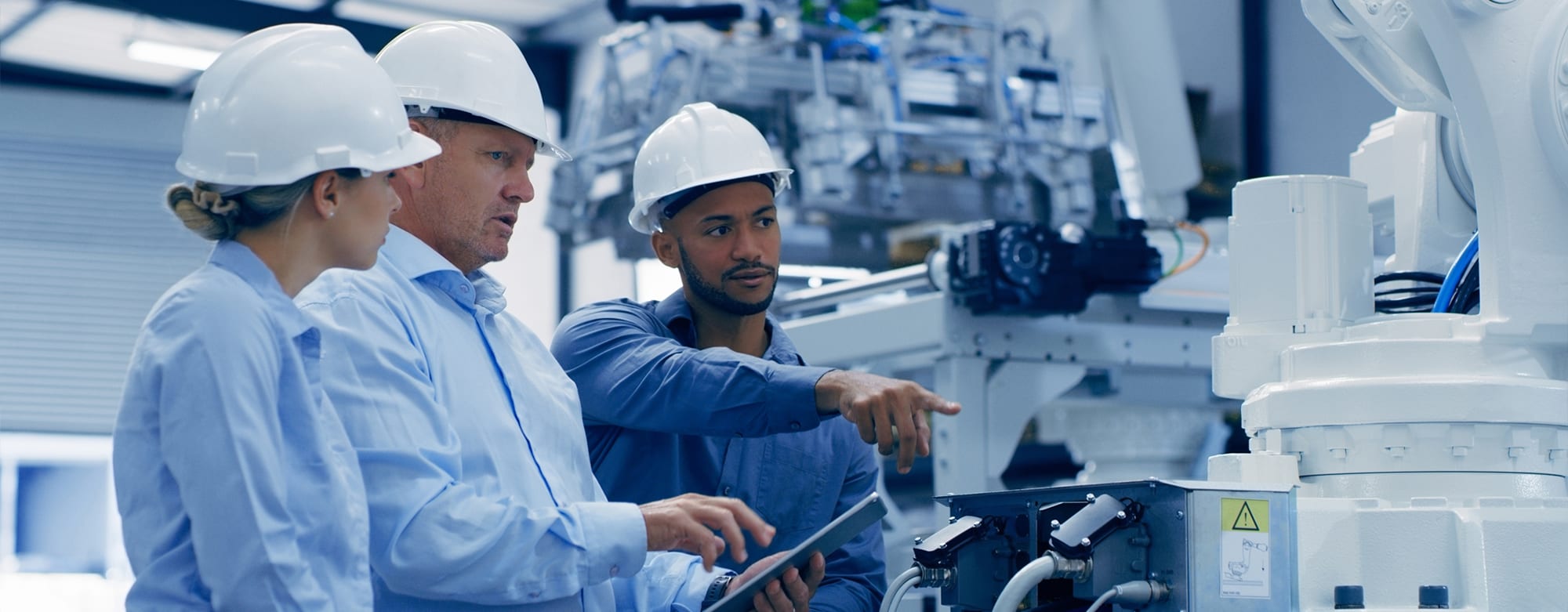Learn how the combination of digital transformation and integrated manufacturing can extend Industry 4.0 benefits, like real-time process visibility, in-depth data analysis, and continuous process optimization, from the confines of your factory floor to processes ranging from product design to outbound logistics and help process manufacturers achieve critical safety, quality, compliance, and cost improvements.
Miguel Gudino, Application Engineer, RS

In Part 2 of our two-part “Digital Transformation and Integration in Process Manufacturing” article, you’ll learn about integrated manufacturing in the process manufacturing industry, integrated manufacturing solutions optimized for use in the process manufacturing industry — including sensors, industrial connectivity solutions, PLCs, and industrial data communications devices, and how RS can help you begin or enhance your digital transformation and integration process.
Missed Part 1? Click here to learn about process manufacturing, digital transformation trends in the process manufacturing industry, and the future of integrated manufacturing.
Integrated Manufacturing in the Process Manufacturing Industry
IT/OT convergence is already well underway in the process manufacturing industry, paving the way for future advancements that deliver even more impactful benefits. Many chemical, food and beverage, and pharmaceutical manufacturers have begun integrating smart data management systems with Industry 4.0 technologies and benefitting from real-time process and supply chain optimization, reduced costs, enhanced traceability, easier regulatory compliance, and improved safety, quality, and competitiveness.
In addition to the automation technologies that have become increasingly commonplace throughout the industrial market over the last 10–15 years or so, IIoT technologies have proven especially popular in the process manufacturing industry. IIoT networks rely on arrays of smart devices, like sensors; connectivity solutions, like connectors and cabling; industrial controllers, like PLCs; and industrial data communications devices, like routers, to collect and transmit equipment and process data. When utilized in integrated manufacturing schemes, they also rely on edge, central, and cloud computers, and data management systems, like MES and ERP, to analyze and act upon data, as well as facility security solutions, like safety switches, that add another layer of safety and quality assurance by preventing unauthorized personnel from accessing and tampering with equipment and providing authorized personnel with access to equipment that requires manual inspections, adjustments, or repairs.
These components are all readily available from trusted suppliers. But process manufacturers must exercise extra care during the procurement process to ensure compliance with relevant regulations (e.g., FDA regulations for food, beverage, and pharmaceutical manufacturers) and resistance to relevant environmental hazards (e.g., high-pressure washdowns) in addition to addressing concerns common to both the process and discrete manufacturing industries, such as cost management, protocol compatibility (both with legacy equipment and other smart devices), cybersecurity, and industry standards (e.g., UL and National Safety Foundation [NSF] electrical standards).
Integrated Manufacturing Solutions for the Process Manufacturing Industry
Sensors deployed in IIoT networks are essential to the digital transformation and robust integration of the process manufacturing industry. They digitalize and transmit critical equipment and process data, providing manufacturers with valuable insights they can leverage to increase accuracy, boost efficiency, enable predictive maintenance and process optimization, reduce downtime, improve product quality, and ensure regulatory compliance.
IIoT sensors used in the process manufacturing industry — and especially in segments like food and beverage, chemical, and pharmaceutical manufacturing — must provide accurate measurements and reliably withstand a range of environmental hazards, including high-pressure sanitary washdowns, aggressive cleaning chemicals, and high temperatures. ifm efector offers a variety of sensors tailored to improve accuracy, safety, uptime, and integration in process automation applications, like those in the food and beverage industry. These products feature hygienic housings, exhibit exceptional resistance to pressure, temperature, aggressive cleaning agents, and liquid ingress, and provide accurate, reliable performance. The ifm PI Series sanitary pressure and level sensors, for example, are ideal for tank level and pressure measurements. They feature improved diagnostics, enhanced performance, user-friendly displays, and IP69K protection designed for washdown, clean-in-place (CIP), and steam-in-place (SIP) processes. These FDA-compliant devices also have high temperature ratings of up to 150°C and ceramic capacitive measuring cells — the most robust pressure measurement technology currently available. Unlike competing pressure sensors with fragile metal diaphragms, these ingress-, corrosion-, and abrasion-resistant sensors don’t require fill fluid and don’t fatigue or fail due to overpressure or handling. They also have a 32-bit-resolution processor capable of providing approximately 20,000 steps throughout the measurement range, which ensures that pressure and level measurement aren’t influenced by foam or turbulence in the tanks, and a microcontroller compatible with IO-Link communication. This allows them to provide highly accurate digital measurement signals and multiple pressure and temperature process values over a single wire, which reduces wiring requirements, system complexity, and possible points of failure, as well as part and labor costs.

Industrial connectivity solutions, like connectors and cabling, are also essential for integrated process manufacturing. These products transmit data from IIoT devices, like sensors, to PLCs that use it and custom programming to make decisions about controlling machinery and processes and industrial data communications solutions that route it to edge, central, and cloud computing systems for in-depth analyses that can be used to improve things like safety, compliance, quality, efficiency, and productivity.
Connectivity solutions employed in process manufacturing applications are typically compact, robust, easy to install, capable of high-data-rate transmission, and resistant to environmental hazards ranging from sanitation hazards, like water ingress, chemical exposure, and corrosion, which are common in food, beverage, and pharmaceutical manufacturing, to production hazards, like heat or potential explosions, which are common in chemical manufacturing.
Murrelektronik, for example, offers a comprehensive range of connectors and cable assemblies engineered for food and beverage industry applications. All of the connectivity solutions in its F&B PRO line satisfy relevant hygiene, cleanliness, and corrosion protection requirements in the three major machine zones (food contact zones, wet zones, and dry zones), as well as in control cabinets, and support easy integration and scalability with features like flexibility, modularity, quick and easy mating mechanisms, and IO-Link capabilities. These products are also energy efficient and designed to increase system availability and, when properly integrated, provide comprehensive diagnostics. The Ecolab-certified F&B PRO connectors and cable assemblies designed for use in food contact zones feature FDA-compliant food-grade materials, including stainless steel housings and TPE-S cable, as well as options with IP69K sealing and rugged resistance to hydrogen peroxide and acidic and alkaline solutions.

ABB’s Thomas & Betts brand FSCG Series cable glands for food, beverage, and pharmaceutical manufacturing applications feature similar characteristics. Designed to enable the safe termination of non-armored, portable, and tray cables into process manufacturing equipment, FSCG Series cable glands feature a smooth, hygienic, single-piece, fully enclosed, and corrosion-resistant stainless steel construction with FDA-compliant EPDM seals rated IP66 through IP69. They are also rated for normal operating temperatures extending from -50°C to +125°C and short-term operating temperatures extending from -50°C to +150°C and are ideal for use in splash zones and washdown, packaging, and transfer areas. Approvals include NSF 169-2012, RoHS, WEEE 2002/96/EC, and LVD 2014/35/EU. Learn more in this RS Tech Talk video.
PLCs receive data from properly interconnected IIoT devices, like sensors, and use that data and internal logic programming to control and automate system processes, like energizing or de-energizing a solenoid valve that opens and closes a process valve. These small industrial computers are typically installed directly on machinery and, as such, must be ruggedized. Other optimal characteristics include high reliability, ease of programming, and fault analysis diagnostics. I/O solutions, like connectivity solutions, help link IIoT sensors to PLCs and other controllers.
Siemens’ SIMATIC ET 200 distributed I/O systems are multifunctional, modular, and scalable industrial automation systems designed to deliver integrated and optimized data availability throughout the entire value-added chain. Some of these systems are also MultiFieldbus solutions that allow manufacturers to use the same hardware to communicate with the three most common networks used in industrial markets: PROFINET, Ethernet/IP, and Modbus/TCP. These I/O solutions enable standardization, even between devices with disparate communications protocols, and make machine data accessible to IT without requiring any complex or time-consuming adjustments or replacing the devices or PLC, which is especially important since different protocols are ideally suited for different types of automation applications.

SIMATIC ET 200 MultiFieldbus I/O solutions feature standardized cabinet designs, wiring and test methods, and documentation sets and support a wide range of control cabinet and on-machine solutions via models with various IP ratings. The SIMATIC ET200eco PN I/O modules, for instance, are especially compact and rugged block I/O solutions designed to enable flexible configurations, simple installation, and fast commissioning. Designed for cabinet-free, on-machine installation, they have a pressurized zinc housing sealed to IP65/67 or IP69K and rated for operating temperatures extending from -40° to +60°C, which makes them suitable for use in process manufacturing applications exposed to high-pressure washdowns, steam jets, and hot water. They’re also ruggedly resistant to vibration, dust, and oil. Additional features include mounting flexibility (head-on or 90°) that optimizes installation space; a two-port switch that enables flexible configurations, including integration into line topologies; and L-coded M12 power connectors that simplify the power supply concept, exhibit high current-carrying capabilities, and offer long cable lengths. Further, MultiFieldbus capabilities allow users to choose the optimal protocol for their application.
Industrial Data Communications devices, like routers, also enable the swift, seamless, and failsafe transmission of equipment and process data collected by IIoT devices, like sensors. But unlike PLCs, which use the data to control and automate system processes, these devices route it to edge, central, and cloud computing systems for in-depth analyses that can be used to improve things like safety, compliance, quality, efficiency, and productivity. They can also play a key role in cybersecurity, which is especially vital in process manufacturing applications due to both the various safety and quality regulations imposed on the food and beverage, pharmaceutical, and chemical manufacturing industries and the economic and market impacts that data losses and production delays can cause.

Phoenix Contact’s mGuard family of rugged, industrial-grade security devices provide integrated firewall, router, and optional VPN functionality, enabling secure remote system support and maintenance while protecting networked industrial systems from accidental interruption and malicious attacks. They are also efficient, reliable, and easy to integrate, which saves on installation, maintenance, and energy costs. The family’s VPN capabilities enable secure and convenient remote maintenance that reduces travel and labor costs and downtime. All data is encrypted per the secure IPsec standard, and a firewall monitors and controls all access. Its router capabilities allow users to quickly and easily network machines and systems, isolate office networks from control networks, and regulate the traffic coming through. They also support network address translation (NAT), which allows production cells with identical IP addresses to use the same high-level network without individual machine configuration, which simplifies installation, reduces installation time and costs, and enhances security and privacy. Other advantageous features include built-in stateful firewalls for local device protection and deep-packet inspection (DPI) firewalls for some popular industry protocols, which allows them to protect part of the system network, a complete production cell, or an individual automation component. Additionally, in operating environments that make it difficult to establish physical connections but could benefit from remote monitoring and control, select mGuard models can provide connectivity via cellular networks.
Networked facility security solutions, like safety switches that can be used to control equipment access, are another key element of integrated process manufacturing systems — adding another layer of safety, quality, and regulatory assurance to food and beverage, pharmaceutical, and chemical manufacturing applications in order to better protect customers and prevent contamination and long-term brand damage. Many industrial safety and security solutions are ruggedized against hazards like shock, vibration, and extreme operating temperatures, and a growing number of them are offering robust resistance against sanitation and sterilization processes, like high-pressure, high-temperature, and harsh-chemical washdowns, as process manufacturing organizations work to improve quality and compliance, avoid downtime, and cut costs.

Omron’s D40ML magnetic-locking safety interlock door switches, for instance, utilize RFID technology to provide high-holding-force tamper resistance. IP69K-rated stainless steel versions are proven to withstand high-pressure, high-temperature washdowns, making them ideal for use in food and beverage processing, sanitary packaging, and machine guarding applications with no rundown time if power is lost. These switches also feature diagnostic LEDs for quick and easy troubleshooting and maintenance, allow users to install up to 20 switches in series, and leverage residual magnetism to provide a light door latch after unlocking, which can help deter unauthorized personnel from following authorized personnel into restricted areas. D40ML safety switches are available with plastic, diecast metal, or corrosion-resistant 316 stainless steel housings; basic (identically coded) or unique (individually coded) actuators, both of which offer tolerance for misalignment and the latter of which is capable of 32,000,000 codes; and two switch sizes with multiple holding force options: medium-duty, which delivers 600N in stainless steel and 900N in plastic and diecast metal variants, and heavy-duty, which delivers 950N in stainless steel and 1,500N in plastic and diecast variants.
Begin or Enhance Your Digital Transformation and Integration Process With RS
Embracing Industry 4.0 trends and technologies, like digitalization, smart devices, and IIoT networks, provides you with real-time process visibility and alerts that can help safeguard employees and equipment, reduce downtime, and improve efficiency. Capitalizing on their advanced connectivity, communications, diagnostics, and accessibility features by integrating these OT solutions with your IT solutions, like MES and ERP, will extend those benefits from the confines of your factory floor to processes ranging from product design, procurement, and supply chain management through to production, maintenance, and outbound logistics.
The combination of digital transformation and integration allows you to respond to adverse business and supply chain events in a timely, collaborative, and effective fashion and minimize value chain disturbances that — if left unchecked — could lead to suboptimal asset utilization, higher costs, and reduced margins. Digitalization and IT/OT convergence can also improve the speed, accuracy, reliability, and security of data transmission and analysis and ease the time and cost burdens associated with regulatory compliance, resulting in better decision-making and safer, more efficient, cost-effective, productive, and profitable applications. They can also extend access to secure remote monitoring and control capabilities that help improve uptime, reduce costs, and improve safety and quality and set you up to scale and sharpen your competitive edge as innovations like AI, AR, VR, and advanced robotics become readily available.
To learn more about digital transformation and implementing Industry 4.0 technologies both in general and in the process manufacturing industry, please visit the links embedded here. To learn more about the RS portfolio of process manufacturing solutions, including economical, industrial-grade RS PRO brand IIoT solutions, please visit these links and those embedded throughout the article. To begin or enhance your digital transformation and integration process, please contact your local RS representative at 1.866.433.5722 or reach out to our technical product support team.






